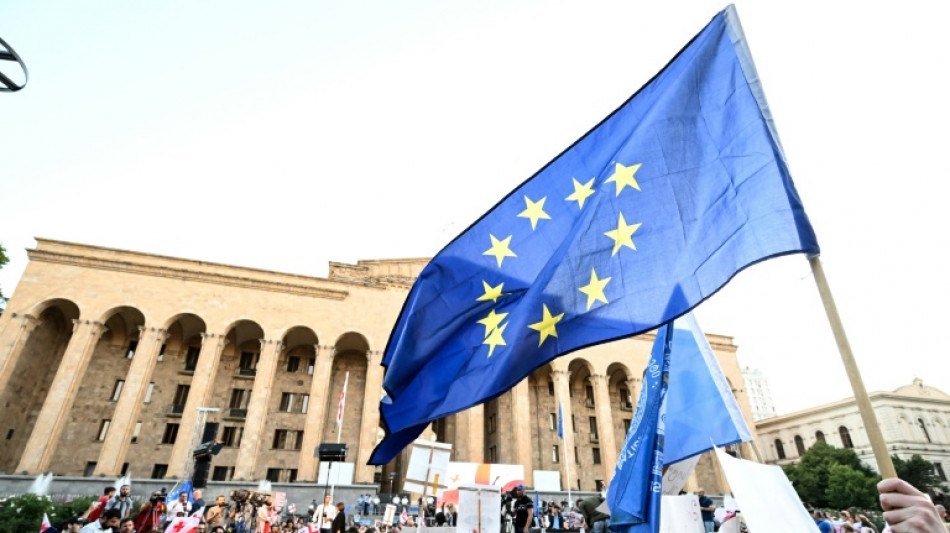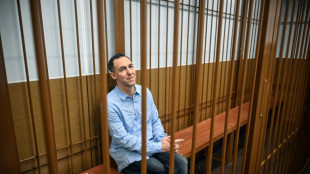

Georgians rally en mass for EU, urge government to quit
Georgians staged a new mass rally on Sunday demanding that the government resign over its failure to formally secure candidacy for membership of the European Union.
The Black Sea nation has been in the grip of mass protests since EU leaders decided in late June to defer Tbilisi's application for membership, pending sweeping political reforms.
The biggest demonstrations in decades, which saw at least 120,000 take to the streets on June 20, are being organised by leading pro-democracy groups and supported by opposition parties.
On Sunday evening, more than 35,000 demonstrators gathered outside Georgian parliament, blocking traffic at the main thoroughfare of the Georgian capital, Tbilisi, according to an AFP correspondent at the scene.
Waving Georgian and EU flags, demonstrators sang the national anthem as many held placards that read "We are Europe".
"Our demonstration is focused on the historic goal of Georgia's European integration," one of the rally organisers, prominent writer and civil activist Lasha Bugadze told the crowd.
"The government's reaction to our constructive, peaceful, non-violent protests has been totally inadequate," he said.
The ruling party has accused the opposition of "plans to overthrow the authorities by organising anti-government rallies".
- 'Destructive role' -
On Facebook, the rally's organisers earlier called on Bidznia Ivanishvili, founder of the country's ruling party, to "relinquish executive power and transfer it, in a constitutional manner, to a government of national accord".
A new cabinet "will carry out the reforms required by the EU, which will automatically bring us the status of an EU membership candidate", the statement said.
Ivanishvili, a former prime minister and Georgia's richest man, is widely believed to call the shots in the country despite having no official political role.
Last month, the European Parliament passed a non-binding resolution to impose personal sanctions on Ivanishvili for his "destructive role" in Georgia's political and economic life.
He insists he has retired from politics.
One of the demonstrators, surgeon Nika Gorgaslidze, 45, said: "Ivanishvili controls, from behind the scenes, the government, parliament, courts, media. Such a political system is undemocratic, it's incompatible with Georgia's goal of becoming an EU member."
Another demonstrator, 19-year-old student Marina Sanodze, said: "Our protests will not stop until we have a new government which will carry out the necessary reforms and will bring us closer to the EU membership."
- 'Clear path' -
Georgia applied for EU membership together with Ukraine and Moldova, days after Russia on February 24 invaded Ukraine.
On June 23, EU leaders granted formal candidate status to Kyiv and Chisinau but said Tbilisi could only become an official candidate once outstanding issues were addressed.
EU leaders nonetheless "recognised Georgia's European perspective", a move that President Salome Zurabishvili hailed as "historic".
Prime Minister Irakli Garibashvili has said his government is "mobilised" to meet EU requirements on time "so that we get candidate status as soon as possible".
The deferral of Georgia's candidacy became a foregone conclusion after the European Commission -- the EU's executive arm -- said on June 20 that Tbilisi must implement a number of reforms by the end of 2022 before it was put on a formal membership path.
The EU conditions include ending political polarisation, improving freedom of the press and the courts, electoral reforms and "de-oligarchisation".
"They (Georgians) have a clear path.... When these criteria are met, the candidate status will be granted automatically," the EU foreign policy chief Josep Borrell said on June 23.
The ruling Georgian Dream party's government has faced mounting international criticism over perceived backsliding on democracy, seriously damaging Tbilisi's ties with Brussels.
Plans to join NATO and the EU are enshrined in Georgia's constitution and, according to opinion polls, are supported by at least 80 percent of the population.
P.Mueller--MP



